Blood creator: ‘There’s something naturally funny about tragedy’
Out now on DVD, Blood is a gripping family drama with a fresh voice and a strong cast. We chatted to its writer Sophie Petzal…
Writer Sophie Petzal struggles with humourless TV drama. “I find it really difficult to watch crime shows where everyone’s bleak and frowny and sad.” We’ve seen too much of it, she says – dilemma-led thrillers full of grave characters whose awareness that they’re in a crime drama saps the entertainment value. “If I don’t get a sense of what you’ve lost and the joy that’s been taken from you, I don’t know what I’m rooting for.”
Besides, she adds, there’s just something naturally funny about the combination of tragedy and family dynamics. “There’s humour in the fact that it’s very inconvenient to be trying to chop sandwiches for your mother’s wake while suspecting your father of her murder.”
There’s humour too, in serving an only-one-left-in-the-bakery children’s train cake at a wake, as youngest son Michael does in Petzal’s drama Blood. There’s also comedy, and pathos, in a pair of siblings sharing a box of Bourbon biscuits—their mother’s favourite—at her graveside. Blood may boil down to “a great tragedy” says Petzal, but it’s beautifully rooted in family banalities.
Blood is the story of Cat Hogan (Carolina Main), a middle child of three who returns to her childhood home following her mother’s death. Very quickly, Cat begins to suspect her father of keeping secrets, and a satisfyingly compact mystery emerges from there. It was envisaged as a family drama rather than a thriller, but its cliff-hangers, question marks and the odd pulpy flourish give it a foot in both camps.
The series, which aired in its native Ireland in October and was stripped across a single week of November on Channel 5 here in the UK, is Petzal’s first solo drama. She’s written previously on The Last Kingdom, Medici, Riviera, Jekyll And Hyde and CBBC’s Wolfblood, but this project belonged to her and producer Jonathan Fisher, with directors Lisa Mulcahy and Hannah Quinn.
It’s been a busy twelve months—Blood was story-lined in a fortnight after being green-lit this time last year, and filmed in Ireland this summer—followed by a nerve-wracking few weeks as it aired. Petzal had convinced herself that the Irish broadcast would be the most anxiety-inducing hurdle to clear and that the UK airing would be “much of a muchness” but found that not to be the case.
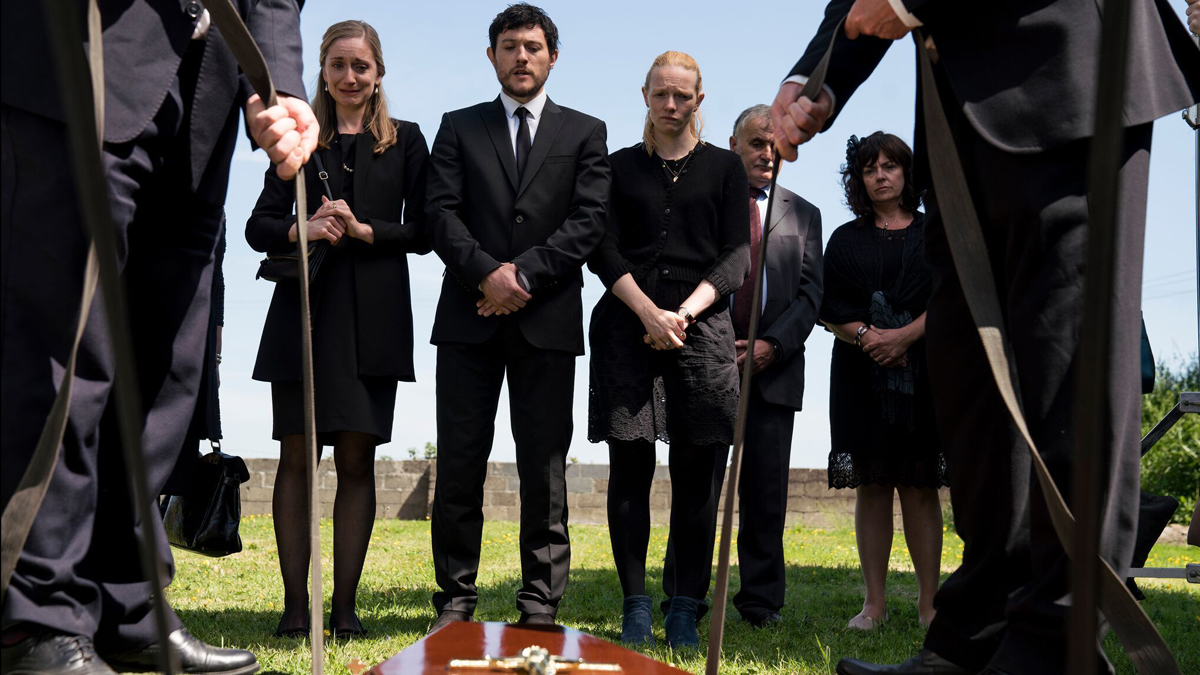
“The UK is my home and it’s also one of the biggest players in television,” she explains. Airing on Channel 5 as a quality original drama, Blood attracted press attention for marking a recent shift in the station’s programming. “Suddenly you realise you’re not just going to go calmly under the radar and no-one will notice.” It felt as though there were eyes on Blood, says Petzal. “That Monday afternoon before it went out I was sort of unhinged,” she laughs. She locked herself in her flat and watched Disney clips on YouTube just to calm down. (Which ones? Out There from personal obsession The Hunchback Of Notre Dame. “I’m the biggest fan of composer Alan Menken.”)
The response to Blood was hugely positive, with good reviews appearing across the national press and even, to Petzal’s delight, on Fern Britton’s Twitter feed. “That was a funny moment, we thought ‘oh, we’ve made it now!’” Petzal laughs. She’s saved a screenshot, of course. “Then I just spent the rest of the week madly overstimulated and unable to sleep because it was too exciting and nerve-wracking, because what if the next episode is the one where they realise it’s actually shit?!” she laughs.
“It was the fact that we’d gotten away without being called frauds,” she tells me. “The fact that we’d got through the week without being torn apart by a national newspaper or somebody saying ‘this is naff as old fucking boots. What is this?!’ It felt like we’d gotten away with it.”
That sounds unnecessarily harsh on yourself, I say. “I’m not riddled with inadequacy!” she explains, but this being her first solo project made her feel “brand new all over again, in a weird way.”
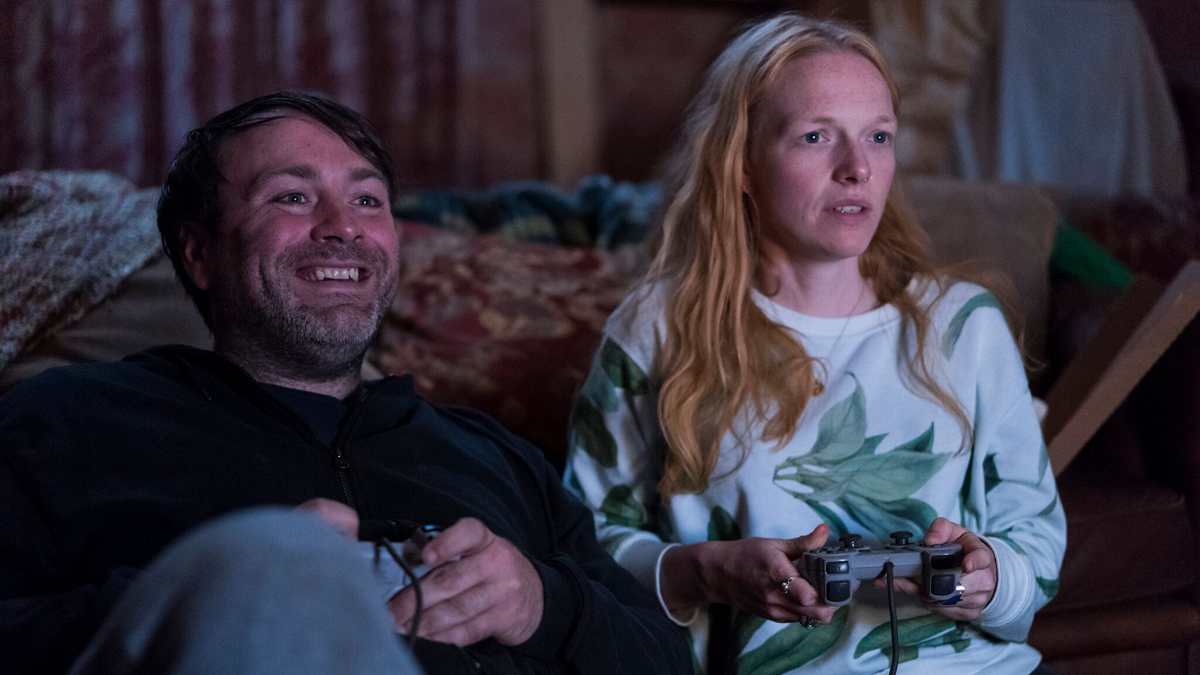
“Working on other people’s shows, all you learn from that is that you’re good at working on other people’s shows and turning things in on time. You only start to work out what your style and worth and value as a writer is when you’re doing your own thing. I feel like I’m only just at the start of that.” The critical and public response to Blood, she concludes, validated all the hard work.
In Ireland and here in the UK, the drama owes a great deal to actor Adrian Dunbar, who championed the project. “I really don’t think we’d have got that early exposure and press interest had he not been in it and talking about it.” Dunbar is a deeply beloved presence, Petzal says, particularly for his work on BBC drama Line Of Duty.
Petzal is “a massive, massive fan” of that show. She and her producer re-watched all four series while filming Blood. “We’re massive fanboys and girls, which is kind of embarrassing but Adrian loves it,” she laughs.
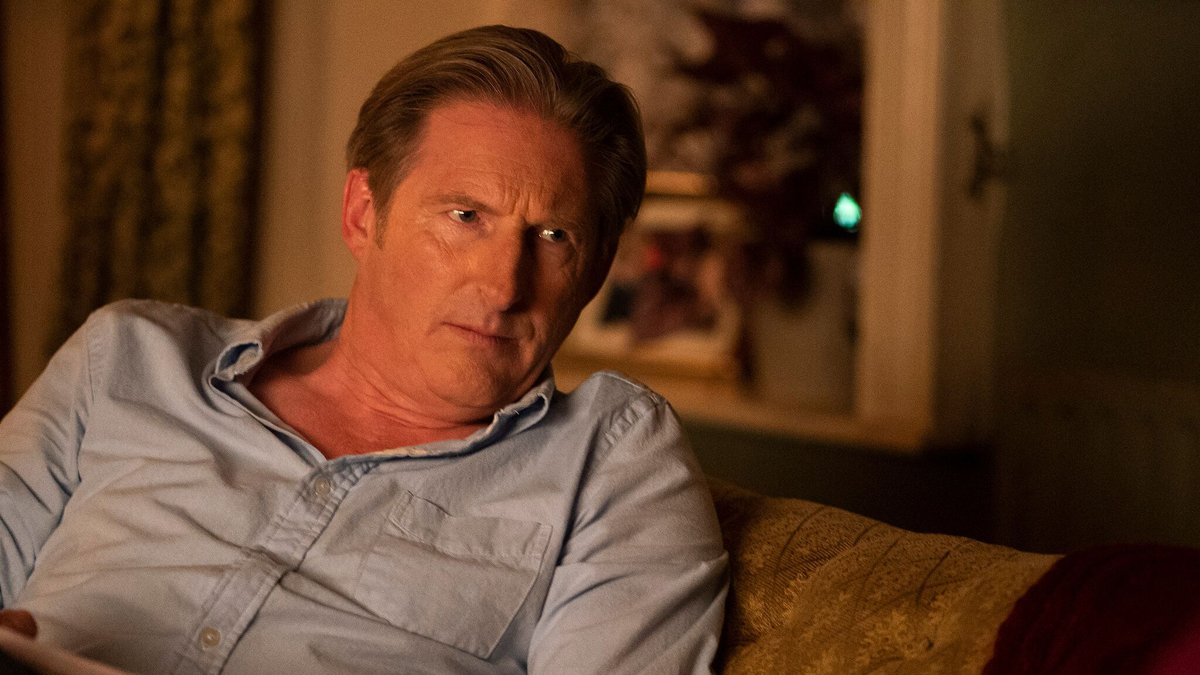
Dunbar’s insights into his character, patriarch Jim Hogan, were a great boon to the Blood, she says. “Adrian approaches his characters with a really forensic, academic head on.” Petzal being on set during the shoot enabled conversations to take place that helped the characters evolve.
“Adrian was always pushing for Jim’s softness,” she explains. He wanted his character to be “a bit more honest and empathetic,” which worked perfectly to the drama’s advantage, says Petzal, because “the more honest and empathetic Jim is, the less people believe him!”
“One news article described Jim as having a smile that never quite reaches his eyes, which is an incredible testament to Adrian’s ability. He was able to play the menace and nuance that we wanted just in the way he stands and looks and delivers lines, which means I didn’t need to go to such an extent to reflect that menace in the lines themselves. It has a far more powerful effect for it.”
She gives “unending credit” to the cast for trusting in the project. “I’m not a known quantity, this is my first gig, I couldn’t point to a load of other things and say ‘my things tend to be a bit pulpy and weird’. Everyone had to hear me say a thousand times ‘Tone. It’s just the tone of it.’ ‘Why am I jumping out at her in a corridor?’, ‘Because it’ll look great, it’s the tone, it’s funny, it’s weird, it’s ridiculous, but go with it.’ No actor likes to be told ‘it’s just funny, do it!’”
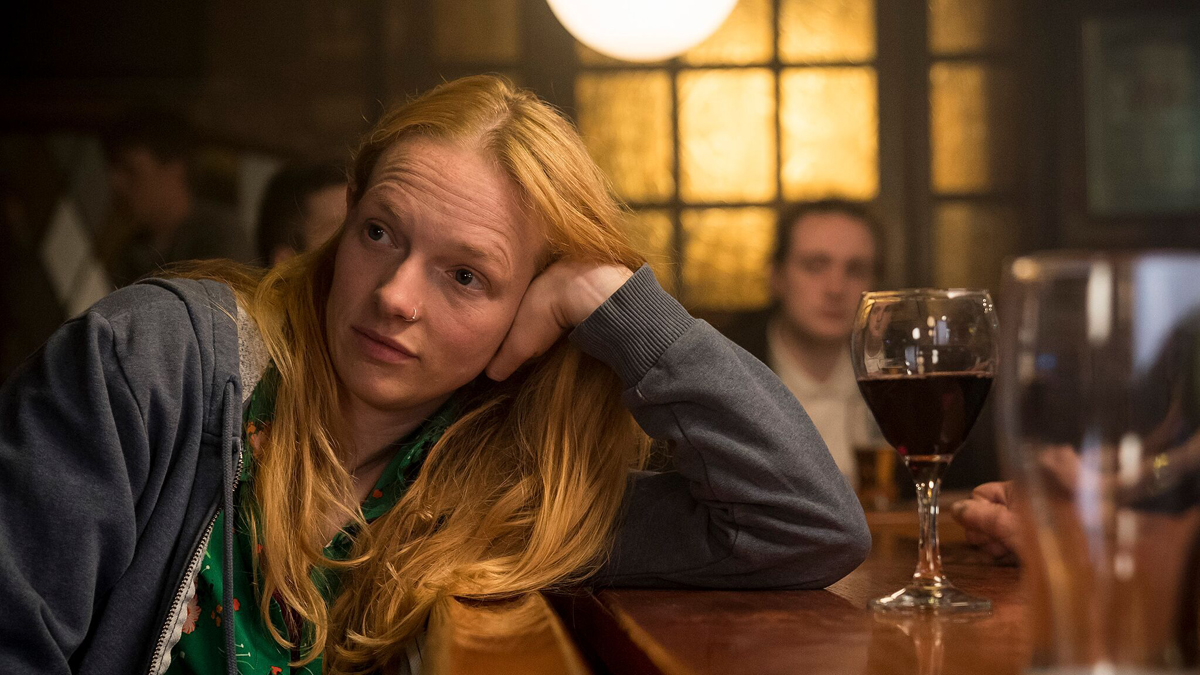
The funny moments in Blood build character, helping to bed the drama’s more outlandish genre elements in naturalism and recognisable human behaviour. The aim, says Petzal, was always to avoid having Cat and her family act “like super-clever TV characters.” One trick, she says, was to mine her own behaviour in similar situations. It’s an exposing approach, but one that really pays off in terms of naturalism.
“When characters are arguing—and in Blood there are a fair few heavy conflicts—it’s so easy when you’re writing disagreements for one character to be clearly right and for the other to be clearly wrong.”
“I found I was writing Cat being incredibly clever and battling the family and withholding all this information that she’s learned. She was keeping the cards close to her chest and was going to play it just at the right moment… then I thought ‘That’s not what I would do.’ That’s not what any normal human being would do.”
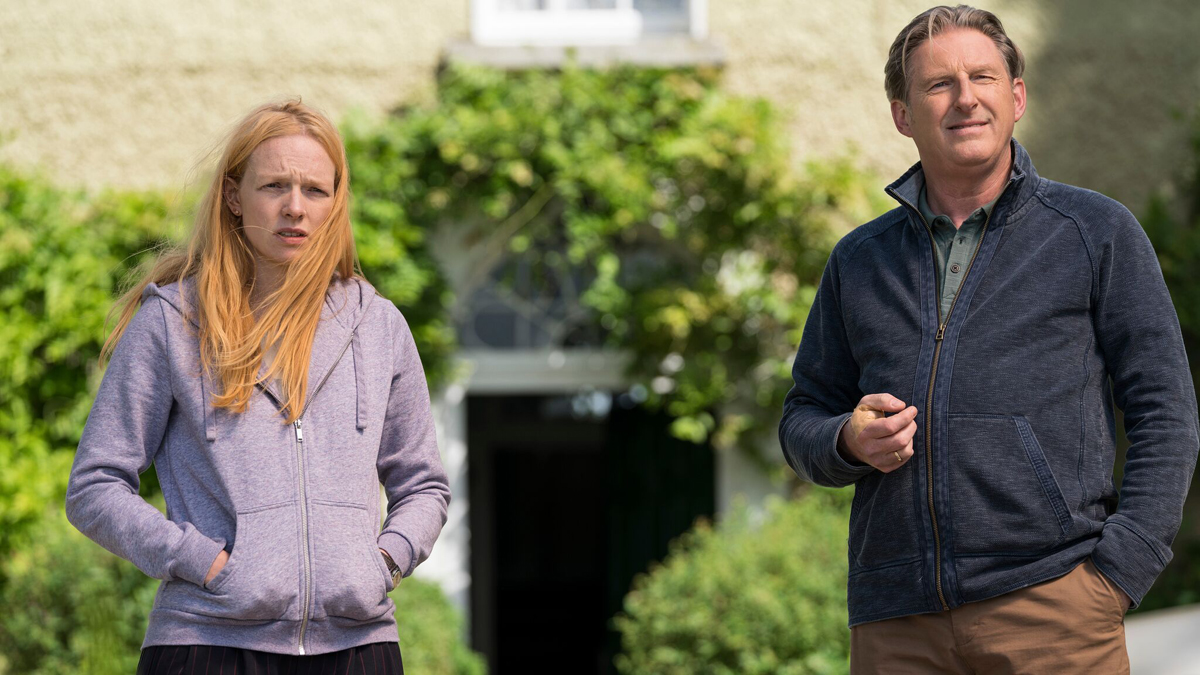
That willingness to show vulnerability in the writing, and to include sometimes unflattering honesty makes Blood stand apart from some other dramas.
“In my heart I’m thinking, if I’m being honest, if this were me, I’d say this really hurtful thing. But often as a writer you’re thinking ‘no, the character is better than me. They’re a TV character. They’re going to do proper TV things.’ When Cat says the wrong thing, or when any character says the wrong or hurtful thing, that’s usually me putting bits of myself in there and echoing arguments and conversations I’ve had.”
One real-life conversation Petzal had that ended up in the finale in flashback involved the strange mating habits of domestic dogs. On screen, it’s a laugh-out-loud moment between husband and wife Jim and Mary, and it comes after one of the show’s most emotional sequences. The idea was to disrupt the dull cliché about women on TV suffering from serious illnesses being “these saintly frail figures. I wanted to give a sense of how Mary is this bright spark who’s hilarious and has a filthy sense of humour and what an unjust robbery this disease is. Funny bright sparks going too young.”
Making fun of serious things comes naturally to Petzal, she says. She wanted to avoid the tragedy becoming too overwrought or earnest. “It’s in human nature to make jokes.”
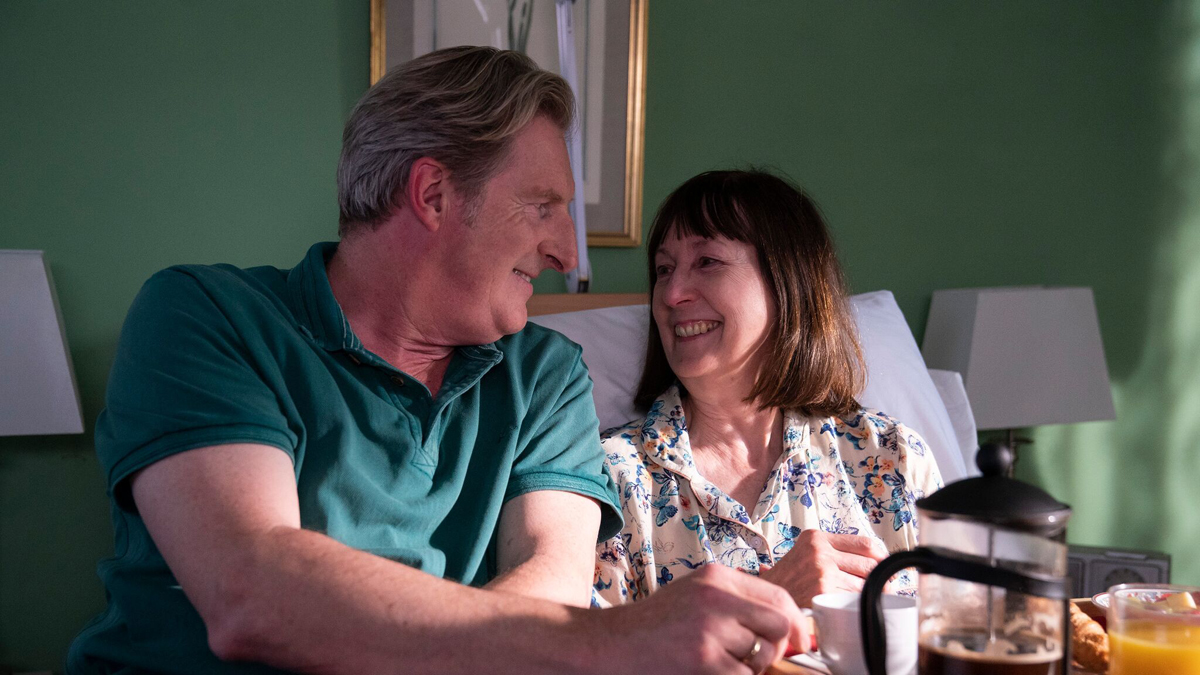
Knotted in with Blood’s humour and tragedy is a moral. “Without wanting to sound too pretentious, I wanted it to feel almost like a parable at the end.”
“I’ve had people say ‘why wasn’t so-and-so just honest from the beginning?’ and I have to raise an eyebrow and ask, ‘have you had parents? Are there times in your own family when things would have been simpler if family members had just told the truth?!’
“The moral of the story—which is a rather on-the-nose line delivered in episode five—is “why can’t we all just talk to each other?” and because we can’t, this is what happens.”
Blood is available now on DVD.
